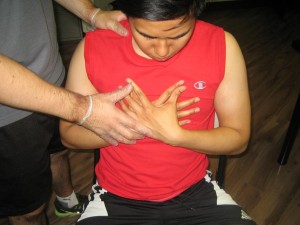Hypertensive emergency is a type of hypertensive crisis wherein blood pressure spikes to a very harmful level that it may damage the organs of the body.

Hypertensive emergency is a type of hypertensive crisis wherein blood level spikes to a very harmful level that it may potentially damage the organs of the body and cause other complications. There is a need to reduce blood pressure immediately to avoid imminent organ damage. Blood pressure readings is given in two numbers, written as 120/80 mmHg. The first number is called the systolic blood pressure whereas the second number is called the diastolic blood pressure. Normal blood pressure should read less than 120/80 mmHg most of the time, whereas hypertension is read as any number greater than 140/90 mmHg.
Hypertensive emergency is different from hypertensive urgency, another type of hypertensive crisis, wherein there is a spike in blood pressure but there is no damage that occurs to the organs of the body. It can be managed with blood pressure medication. On the other hand, given from its names, hypertensive emergency is a medical emergency that requires immediate emergency medical help. Treatment to lower high blood in a hypertensive emergency can usually only be done in an emergency room.
Causes of Hypertensive Emergency
The following may lead to hypertensive emergencies:
- Forgetting to take blood pressure medication
- Heart attack
- Heart failure
- Kidney failure
- Stroke
- Aorta rupture (the main artery of the body)
- Interactions that may occur between medications
Signs and Symptoms of Hypertensive Emergency
In some cases of hypertension, there are no symptoms present. However, in cases of hypertensive emergencies, the following signs and symptoms may include:
- Severe chest pain
- Intense headache, supplemented by blurred vision and/ or increasing confusion
- Severe anxiety
- Shortness of breath, that may be increasing
- Nausea and vomiting
- Seizures
- Unresponsiveness
Complications of Hypertensive Emergency
If left untreated or treatment time takes too long, complications may arise from hypertensive emergencies. Some of the hypertensive emergencies be severe, which can include:
- Altered mental state, e.g. confusion
- Stroke or bleeding into the brain
- Heart failure
- Heart attack
- Unstable angina
- Pulmonary oedema (or fluid in the lungs)
- Aneurysm
- Eclampsia (occurs during pregnancy)
First Aid Management of Hypertensive Emergency
When a person discovers that they have hypertension, it should be treated immediately to avoid progressing to hypertensive emergencies. In scenarios that a person shows symptoms of hypertensive emergency, the following steps are generally recommended:
- Call for emergency medical services immediately. If there is no access to this, have another person drive the victim to the hospital right away.
- Do not wait to see if pressure reduces on its own.
Disclaimer: This article does not provide medical advice or treatment. The information given should not be used for self-diagnosis. Seek medical attention when necessary. Learning how to recognize symptoms of medical emergencies can help save a life. To learn more about to how to recognize symptoms, enrol in first aid and CPR training that includes content related to circulatory emergencies.
Sources:
High blood pressure (hypertension). (2011). Mayo Clinic. Retrieved on October 14, 2013, from http://www.mayoclinic.com/health/hypertensive-crisis/AN00626
Nazario, Brunilda. (2011). WebMD. Retrieved on October 15, 2013, from http://www.webmd.com/hypertension-high-blood-pressure/guide/hypertensive-crisis
